PSYCH 219: Obesity, Body Image, and Self-Esteem Among Teenagers
VerifiedAdded on 2023/05/28
|13
|1861
|475
Report
AI Summary
This report investigates the impact of obesity on self-esteem among teenagers in the United States. A survey was conducted with 100 participants, focusing on 20 individuals with a BMI over 25. The study examines factors associated with obesity that affect self-esteem, finding that societal pressures and discrimination contribute significantly to diminished self-worth. The results indicate that obese teenagers often face social isolation, leading to depression and potential substance abuse. The report emphasizes the need to change societal beauty standards and promote body positivity from childhood. It also suggests future research into therapies to mitigate the negative impacts of obesity on self-esteem. The appendices include data visualizations of survey responses, highlighting the prevalence of discrimination and the perceived impact of obesity on various aspects of life.
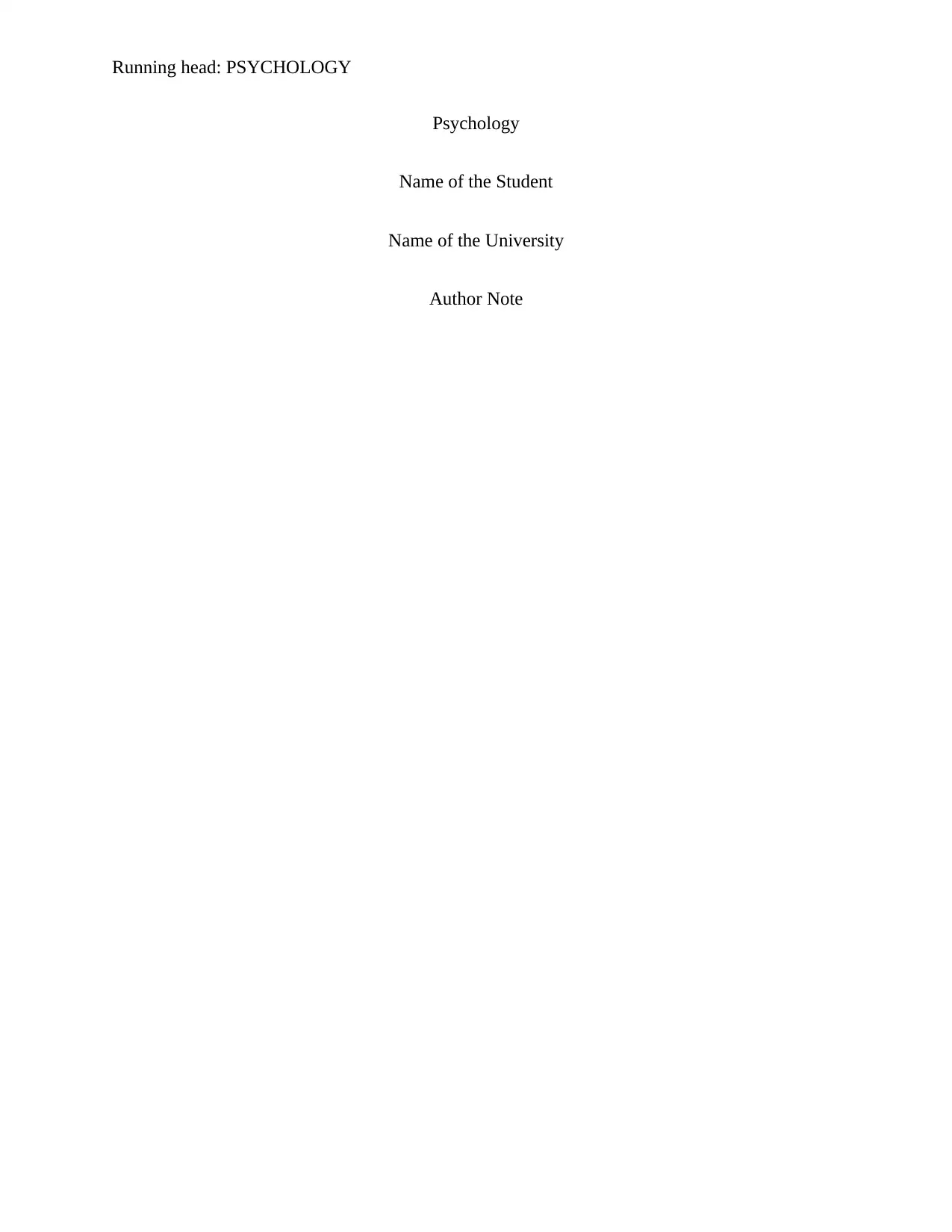
Running head: PSYCHOLOGY
Psychology
Name of the Student
Name of the University
Author Note
Psychology
Name of the Student
Name of the University
Author Note
Paraphrase This Document
Need a fresh take? Get an instant paraphrase of this document with our AI Paraphraser
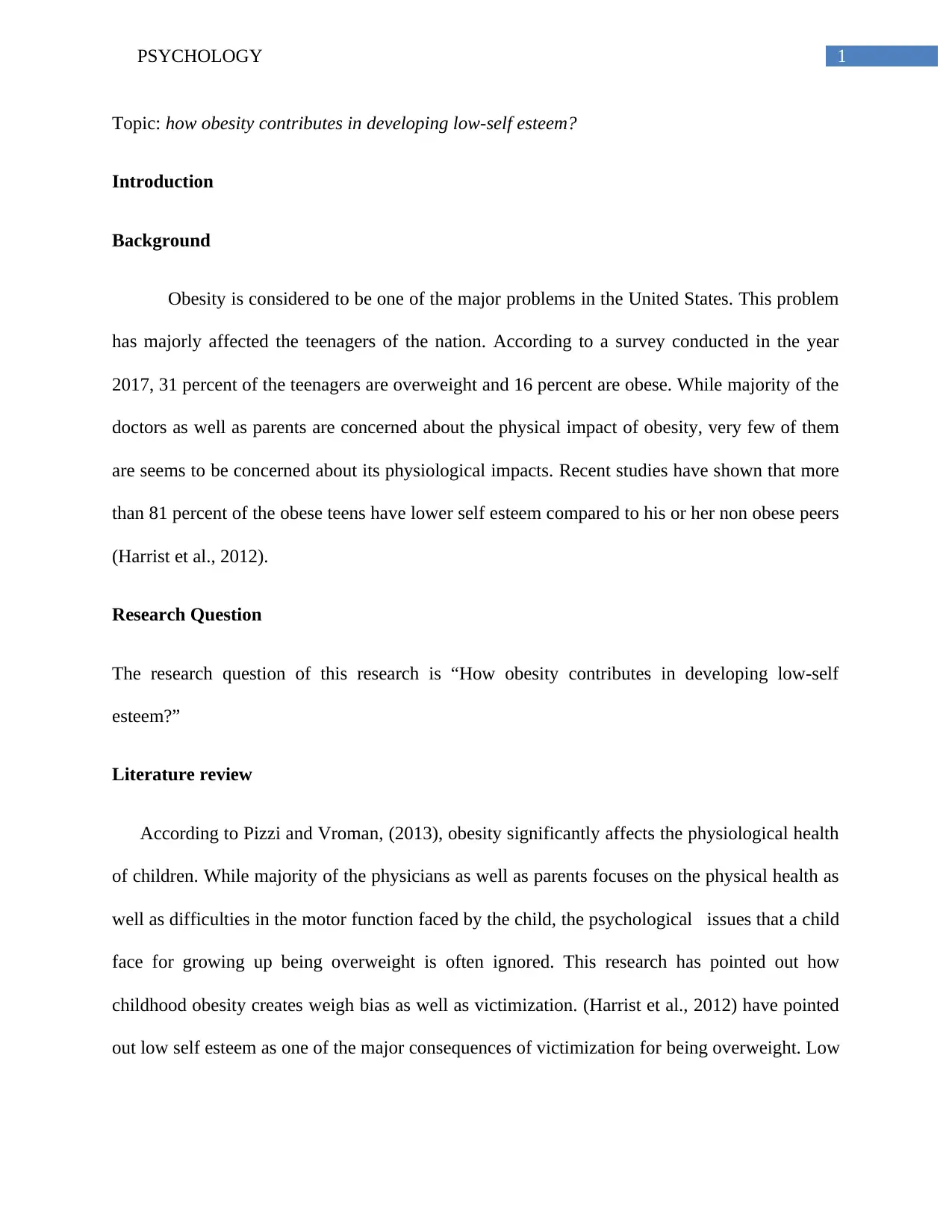
1PSYCHOLOGY
Topic: how obesity contributes in developing low-self esteem?
Introduction
Background
Obesity is considered to be one of the major problems in the United States. This problem
has majorly affected the teenagers of the nation. According to a survey conducted in the year
2017, 31 percent of the teenagers are overweight and 16 percent are obese. While majority of the
doctors as well as parents are concerned about the physical impact of obesity, very few of them
are seems to be concerned about its physiological impacts. Recent studies have shown that more
than 81 percent of the obese teens have lower self esteem compared to his or her non obese peers
(Harrist et al., 2012).
Research Question
The research question of this research is “How obesity contributes in developing low-self
esteem?”
Literature review
According to Pizzi and Vroman, (2013), obesity significantly affects the physiological health
of children. While majority of the physicians as well as parents focuses on the physical health as
well as difficulties in the motor function faced by the child, the psychological issues that a child
face for growing up being overweight is often ignored. This research has pointed out how
childhood obesity creates weigh bias as well as victimization. (Harrist et al., 2012) have pointed
out low self esteem as one of the major consequences of victimization for being overweight. Low
Topic: how obesity contributes in developing low-self esteem?
Introduction
Background
Obesity is considered to be one of the major problems in the United States. This problem
has majorly affected the teenagers of the nation. According to a survey conducted in the year
2017, 31 percent of the teenagers are overweight and 16 percent are obese. While majority of the
doctors as well as parents are concerned about the physical impact of obesity, very few of them
are seems to be concerned about its physiological impacts. Recent studies have shown that more
than 81 percent of the obese teens have lower self esteem compared to his or her non obese peers
(Harrist et al., 2012).
Research Question
The research question of this research is “How obesity contributes in developing low-self
esteem?”
Literature review
According to Pizzi and Vroman, (2013), obesity significantly affects the physiological health
of children. While majority of the physicians as well as parents focuses on the physical health as
well as difficulties in the motor function faced by the child, the psychological issues that a child
face for growing up being overweight is often ignored. This research has pointed out how
childhood obesity creates weigh bias as well as victimization. (Harrist et al., 2012) have pointed
out low self esteem as one of the major consequences of victimization for being overweight. Low
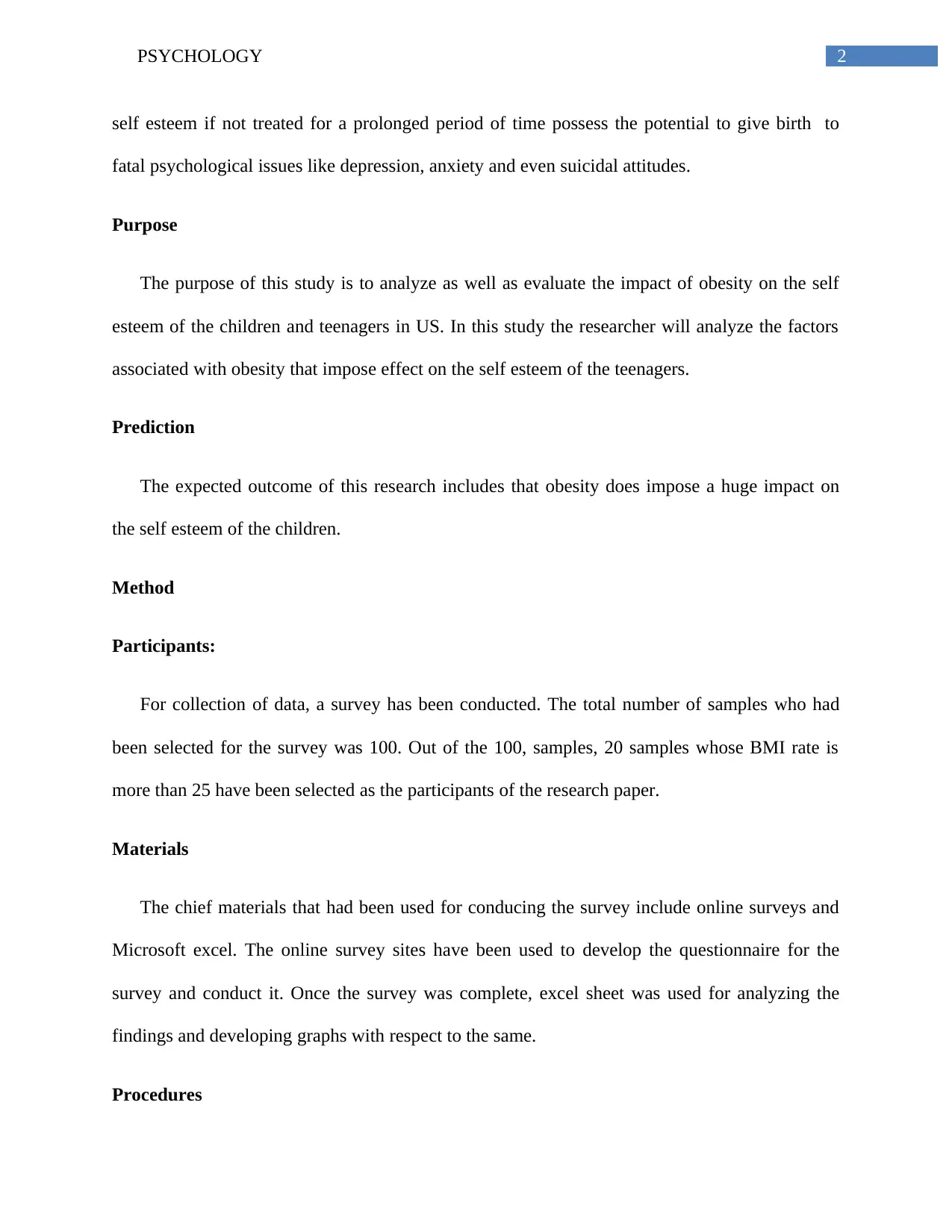
2PSYCHOLOGY
self esteem if not treated for a prolonged period of time possess the potential to give birth to
fatal psychological issues like depression, anxiety and even suicidal attitudes.
Purpose
The purpose of this study is to analyze as well as evaluate the impact of obesity on the self
esteem of the children and teenagers in US. In this study the researcher will analyze the factors
associated with obesity that impose effect on the self esteem of the teenagers.
Prediction
The expected outcome of this research includes that obesity does impose a huge impact on
the self esteem of the children.
Method
Participants:
For collection of data, a survey has been conducted. The total number of samples who had
been selected for the survey was 100. Out of the 100, samples, 20 samples whose BMI rate is
more than 25 have been selected as the participants of the research paper.
Materials
The chief materials that had been used for conducing the survey include online surveys and
Microsoft excel. The online survey sites have been used to develop the questionnaire for the
survey and conduct it. Once the survey was complete, excel sheet was used for analyzing the
findings and developing graphs with respect to the same.
Procedures
self esteem if not treated for a prolonged period of time possess the potential to give birth to
fatal psychological issues like depression, anxiety and even suicidal attitudes.
Purpose
The purpose of this study is to analyze as well as evaluate the impact of obesity on the self
esteem of the children and teenagers in US. In this study the researcher will analyze the factors
associated with obesity that impose effect on the self esteem of the teenagers.
Prediction
The expected outcome of this research includes that obesity does impose a huge impact on
the self esteem of the children.
Method
Participants:
For collection of data, a survey has been conducted. The total number of samples who had
been selected for the survey was 100. Out of the 100, samples, 20 samples whose BMI rate is
more than 25 have been selected as the participants of the research paper.
Materials
The chief materials that had been used for conducing the survey include online surveys and
Microsoft excel. The online survey sites have been used to develop the questionnaire for the
survey and conduct it. Once the survey was complete, excel sheet was used for analyzing the
findings and developing graphs with respect to the same.
Procedures
⊘ This is a preview!⊘
Do you want full access?
Subscribe today to unlock all pages.

Trusted by 1+ million students worldwide
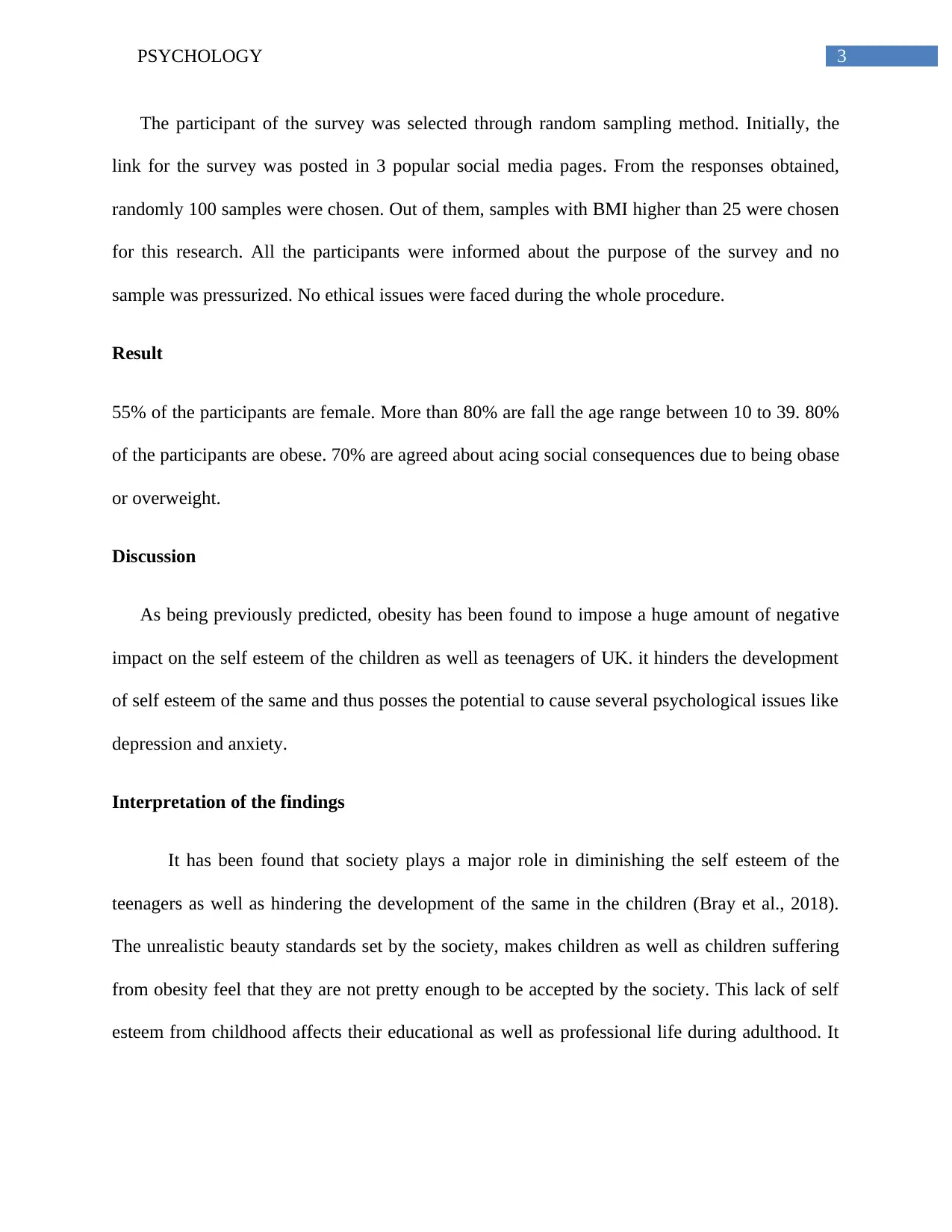
3PSYCHOLOGY
The participant of the survey was selected through random sampling method. Initially, the
link for the survey was posted in 3 popular social media pages. From the responses obtained,
randomly 100 samples were chosen. Out of them, samples with BMI higher than 25 were chosen
for this research. All the participants were informed about the purpose of the survey and no
sample was pressurized. No ethical issues were faced during the whole procedure.
Result
55% of the participants are female. More than 80% are fall the age range between 10 to 39. 80%
of the participants are obese. 70% are agreed about acing social consequences due to being obase
or overweight.
Discussion
As being previously predicted, obesity has been found to impose a huge amount of negative
impact on the self esteem of the children as well as teenagers of UK. it hinders the development
of self esteem of the same and thus posses the potential to cause several psychological issues like
depression and anxiety.
Interpretation of the findings
It has been found that society plays a major role in diminishing the self esteem of the
teenagers as well as hindering the development of the same in the children (Bray et al., 2018).
The unrealistic beauty standards set by the society, makes children as well as children suffering
from obesity feel that they are not pretty enough to be accepted by the society. This lack of self
esteem from childhood affects their educational as well as professional life during adulthood. It
The participant of the survey was selected through random sampling method. Initially, the
link for the survey was posted in 3 popular social media pages. From the responses obtained,
randomly 100 samples were chosen. Out of them, samples with BMI higher than 25 were chosen
for this research. All the participants were informed about the purpose of the survey and no
sample was pressurized. No ethical issues were faced during the whole procedure.
Result
55% of the participants are female. More than 80% are fall the age range between 10 to 39. 80%
of the participants are obese. 70% are agreed about acing social consequences due to being obase
or overweight.
Discussion
As being previously predicted, obesity has been found to impose a huge amount of negative
impact on the self esteem of the children as well as teenagers of UK. it hinders the development
of self esteem of the same and thus posses the potential to cause several psychological issues like
depression and anxiety.
Interpretation of the findings
It has been found that society plays a major role in diminishing the self esteem of the
teenagers as well as hindering the development of the same in the children (Bray et al., 2018).
The unrealistic beauty standards set by the society, makes children as well as children suffering
from obesity feel that they are not pretty enough to be accepted by the society. This lack of self
esteem from childhood affects their educational as well as professional life during adulthood. It
Paraphrase This Document
Need a fresh take? Get an instant paraphrase of this document with our AI Paraphraser
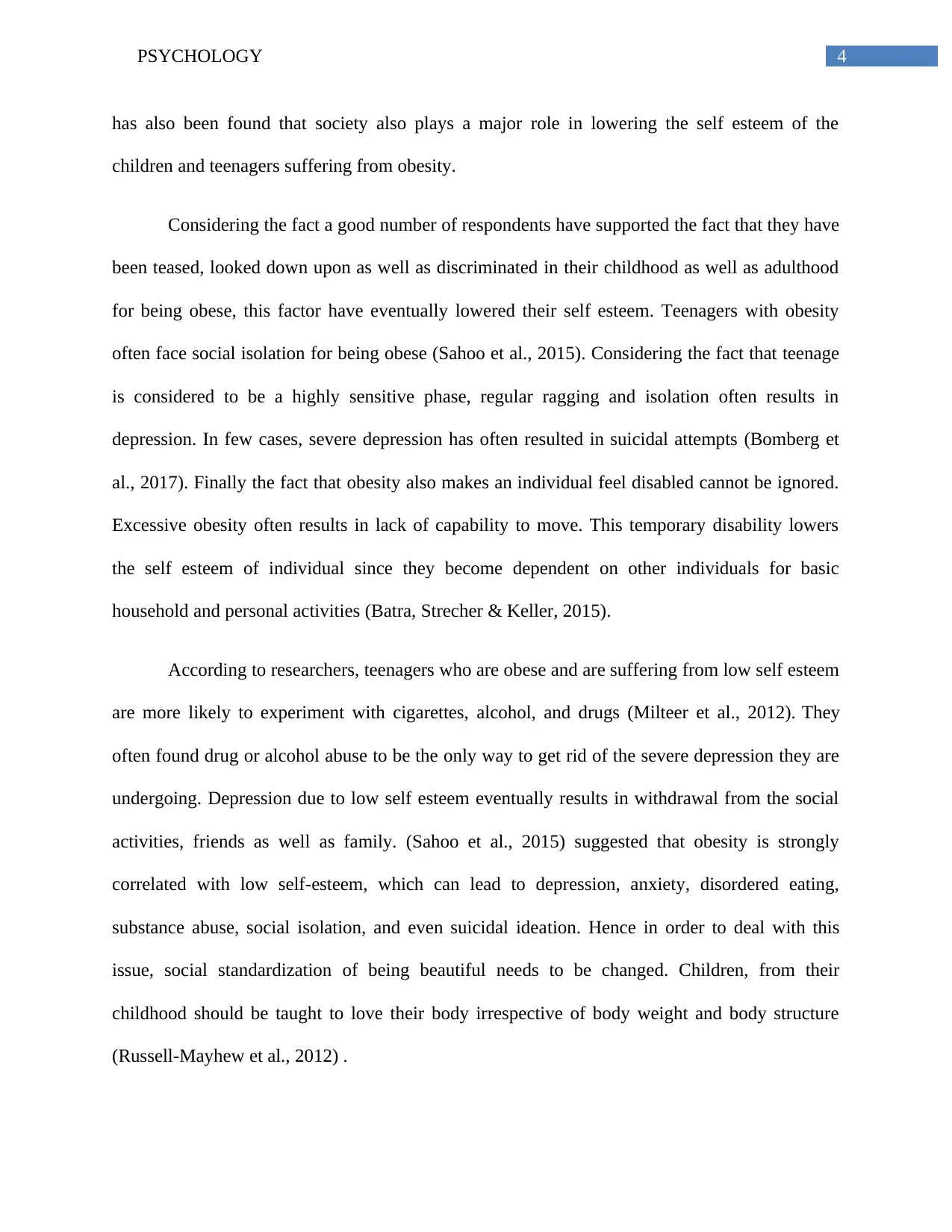
4PSYCHOLOGY
has also been found that society also plays a major role in lowering the self esteem of the
children and teenagers suffering from obesity.
Considering the fact a good number of respondents have supported the fact that they have
been teased, looked down upon as well as discriminated in their childhood as well as adulthood
for being obese, this factor have eventually lowered their self esteem. Teenagers with obesity
often face social isolation for being obese (Sahoo et al., 2015). Considering the fact that teenage
is considered to be a highly sensitive phase, regular ragging and isolation often results in
depression. In few cases, severe depression has often resulted in suicidal attempts (Bomberg et
al., 2017). Finally the fact that obesity also makes an individual feel disabled cannot be ignored.
Excessive obesity often results in lack of capability to move. This temporary disability lowers
the self esteem of individual since they become dependent on other individuals for basic
household and personal activities (Batra, Strecher & Keller, 2015).
According to researchers, teenagers who are obese and are suffering from low self esteem
are more likely to experiment with cigarettes, alcohol, and drugs (Milteer et al., 2012). They
often found drug or alcohol abuse to be the only way to get rid of the severe depression they are
undergoing. Depression due to low self esteem eventually results in withdrawal from the social
activities, friends as well as family. (Sahoo et al., 2015) suggested that obesity is strongly
correlated with low self-esteem, which can lead to depression, anxiety, disordered eating,
substance abuse, social isolation, and even suicidal ideation. Hence in order to deal with this
issue, social standardization of being beautiful needs to be changed. Children, from their
childhood should be taught to love their body irrespective of body weight and body structure
(Russell-Mayhew et al., 2012) .
has also been found that society also plays a major role in lowering the self esteem of the
children and teenagers suffering from obesity.
Considering the fact a good number of respondents have supported the fact that they have
been teased, looked down upon as well as discriminated in their childhood as well as adulthood
for being obese, this factor have eventually lowered their self esteem. Teenagers with obesity
often face social isolation for being obese (Sahoo et al., 2015). Considering the fact that teenage
is considered to be a highly sensitive phase, regular ragging and isolation often results in
depression. In few cases, severe depression has often resulted in suicidal attempts (Bomberg et
al., 2017). Finally the fact that obesity also makes an individual feel disabled cannot be ignored.
Excessive obesity often results in lack of capability to move. This temporary disability lowers
the self esteem of individual since they become dependent on other individuals for basic
household and personal activities (Batra, Strecher & Keller, 2015).
According to researchers, teenagers who are obese and are suffering from low self esteem
are more likely to experiment with cigarettes, alcohol, and drugs (Milteer et al., 2012). They
often found drug or alcohol abuse to be the only way to get rid of the severe depression they are
undergoing. Depression due to low self esteem eventually results in withdrawal from the social
activities, friends as well as family. (Sahoo et al., 2015) suggested that obesity is strongly
correlated with low self-esteem, which can lead to depression, anxiety, disordered eating,
substance abuse, social isolation, and even suicidal ideation. Hence in order to deal with this
issue, social standardization of being beautiful needs to be changed. Children, from their
childhood should be taught to love their body irrespective of body weight and body structure
(Russell-Mayhew et al., 2012) .
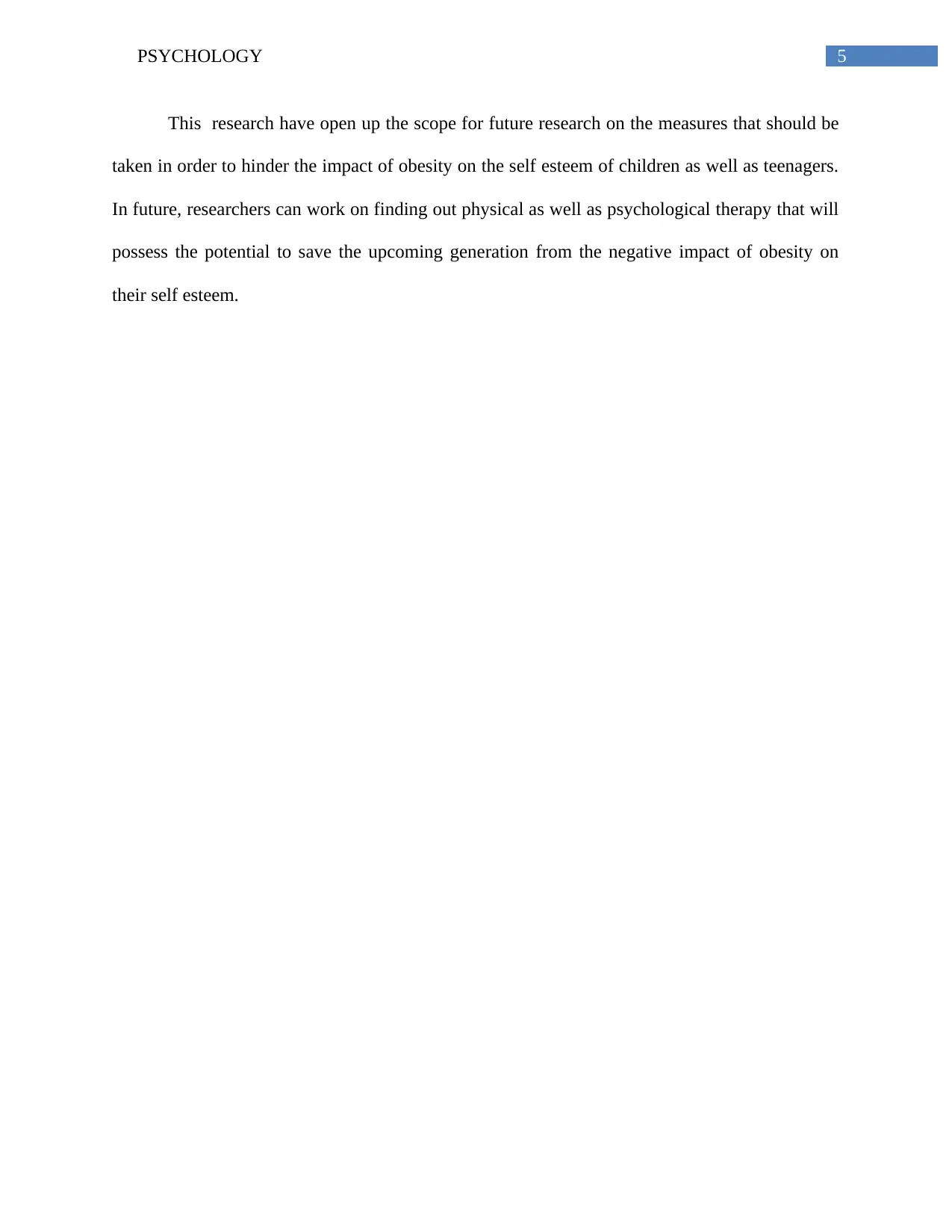
5PSYCHOLOGY
This research have open up the scope for future research on the measures that should be
taken in order to hinder the impact of obesity on the self esteem of children as well as teenagers.
In future, researchers can work on finding out physical as well as psychological therapy that will
possess the potential to save the upcoming generation from the negative impact of obesity on
their self esteem.
This research have open up the scope for future research on the measures that should be
taken in order to hinder the impact of obesity on the self esteem of children as well as teenagers.
In future, researchers can work on finding out physical as well as psychological therapy that will
possess the potential to save the upcoming generation from the negative impact of obesity on
their self esteem.
⊘ This is a preview!⊘
Do you want full access?
Subscribe today to unlock all pages.

Trusted by 1+ million students worldwide
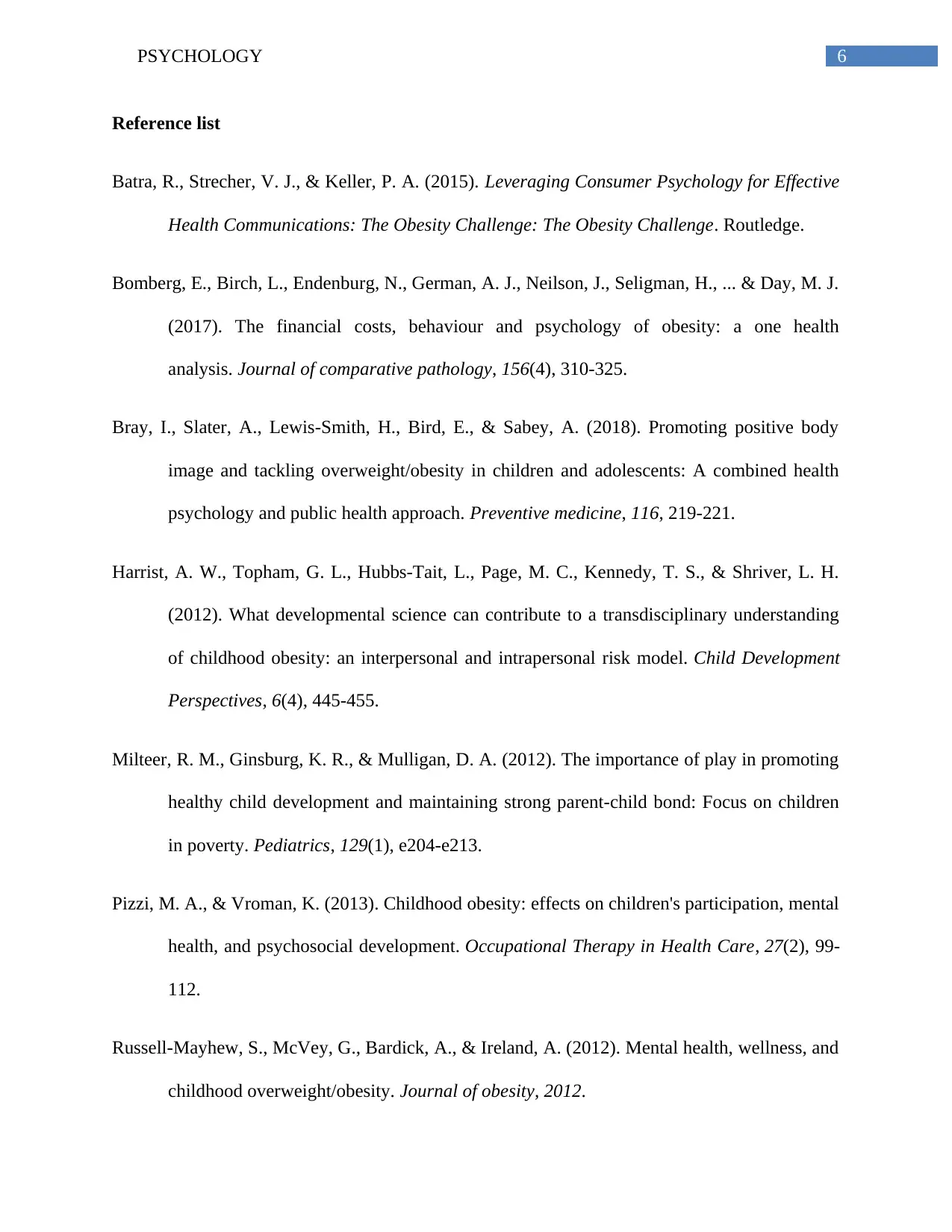
6PSYCHOLOGY
Reference list
Batra, R., Strecher, V. J., & Keller, P. A. (2015). Leveraging Consumer Psychology for Effective
Health Communications: The Obesity Challenge: The Obesity Challenge. Routledge.
Bomberg, E., Birch, L., Endenburg, N., German, A. J., Neilson, J., Seligman, H., ... & Day, M. J.
(2017). The financial costs, behaviour and psychology of obesity: a one health
analysis. Journal of comparative pathology, 156(4), 310-325.
Bray, I., Slater, A., Lewis-Smith, H., Bird, E., & Sabey, A. (2018). Promoting positive body
image and tackling overweight/obesity in children and adolescents: A combined health
psychology and public health approach. Preventive medicine, 116, 219-221.
Harrist, A. W., Topham, G. L., Hubbs‐Tait, L., Page, M. C., Kennedy, T. S., & Shriver, L. H.
(2012). What developmental science can contribute to a transdisciplinary understanding
of childhood obesity: an interpersonal and intrapersonal risk model. Child Development
Perspectives, 6(4), 445-455.
Milteer, R. M., Ginsburg, K. R., & Mulligan, D. A. (2012). The importance of play in promoting
healthy child development and maintaining strong parent-child bond: Focus on children
in poverty. Pediatrics, 129(1), e204-e213.
Pizzi, M. A., & Vroman, K. (2013). Childhood obesity: effects on children's participation, mental
health, and psychosocial development. Occupational Therapy in Health Care, 27(2), 99-
112.
Russell-Mayhew, S., McVey, G., Bardick, A., & Ireland, A. (2012). Mental health, wellness, and
childhood overweight/obesity. Journal of obesity, 2012.
Reference list
Batra, R., Strecher, V. J., & Keller, P. A. (2015). Leveraging Consumer Psychology for Effective
Health Communications: The Obesity Challenge: The Obesity Challenge. Routledge.
Bomberg, E., Birch, L., Endenburg, N., German, A. J., Neilson, J., Seligman, H., ... & Day, M. J.
(2017). The financial costs, behaviour and psychology of obesity: a one health
analysis. Journal of comparative pathology, 156(4), 310-325.
Bray, I., Slater, A., Lewis-Smith, H., Bird, E., & Sabey, A. (2018). Promoting positive body
image and tackling overweight/obesity in children and adolescents: A combined health
psychology and public health approach. Preventive medicine, 116, 219-221.
Harrist, A. W., Topham, G. L., Hubbs‐Tait, L., Page, M. C., Kennedy, T. S., & Shriver, L. H.
(2012). What developmental science can contribute to a transdisciplinary understanding
of childhood obesity: an interpersonal and intrapersonal risk model. Child Development
Perspectives, 6(4), 445-455.
Milteer, R. M., Ginsburg, K. R., & Mulligan, D. A. (2012). The importance of play in promoting
healthy child development and maintaining strong parent-child bond: Focus on children
in poverty. Pediatrics, 129(1), e204-e213.
Pizzi, M. A., & Vroman, K. (2013). Childhood obesity: effects on children's participation, mental
health, and psychosocial development. Occupational Therapy in Health Care, 27(2), 99-
112.
Russell-Mayhew, S., McVey, G., Bardick, A., & Ireland, A. (2012). Mental health, wellness, and
childhood overweight/obesity. Journal of obesity, 2012.
Paraphrase This Document
Need a fresh take? Get an instant paraphrase of this document with our AI Paraphraser
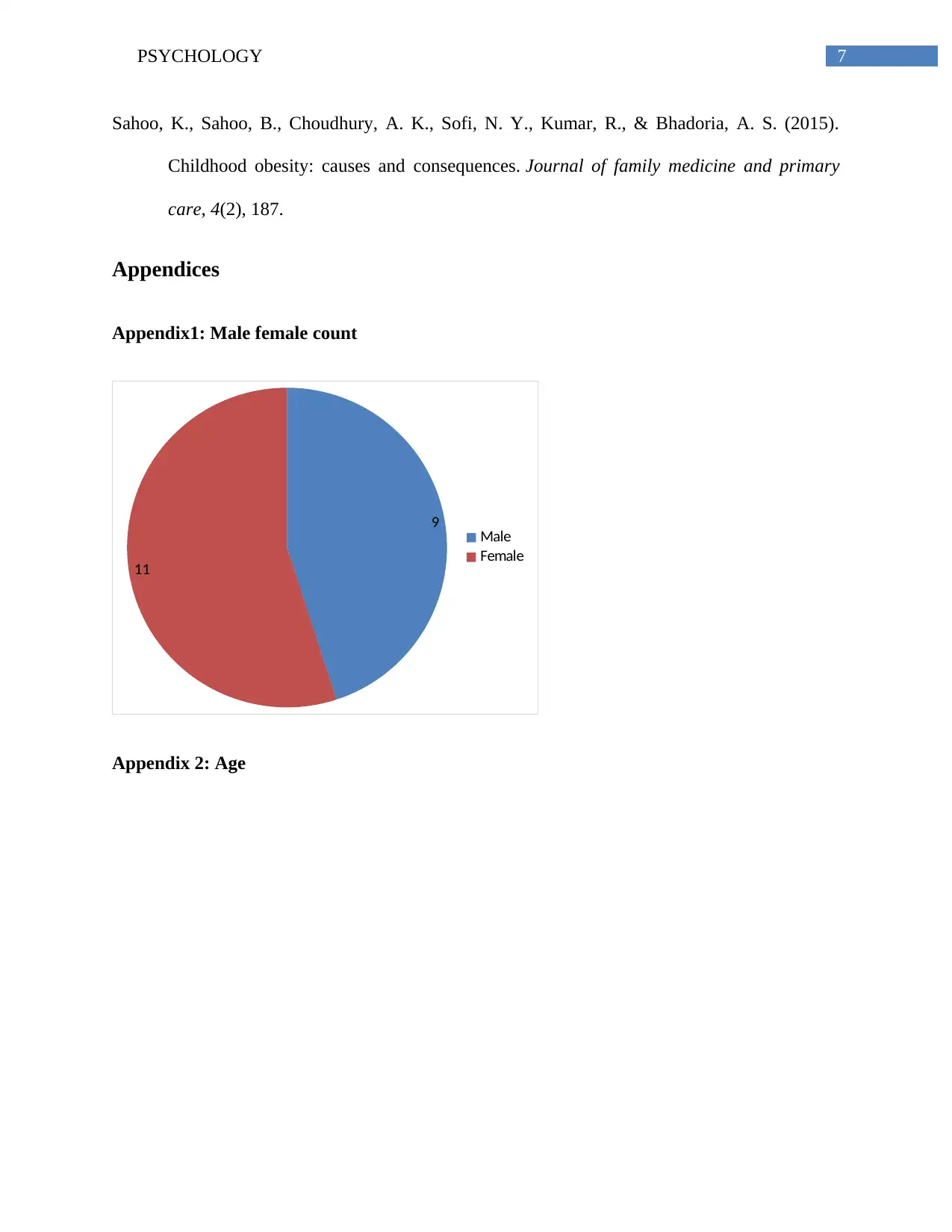
7PSYCHOLOGY
Sahoo, K., Sahoo, B., Choudhury, A. K., Sofi, N. Y., Kumar, R., & Bhadoria, A. S. (2015).
Childhood obesity: causes and consequences. Journal of family medicine and primary
care, 4(2), 187.
Appendices
Appendix1: Male female count
9
11
Male
Female
Appendix 2: Age
Sahoo, K., Sahoo, B., Choudhury, A. K., Sofi, N. Y., Kumar, R., & Bhadoria, A. S. (2015).
Childhood obesity: causes and consequences. Journal of family medicine and primary
care, 4(2), 187.
Appendices
Appendix1: Male female count
9
11
Male
Female
Appendix 2: Age
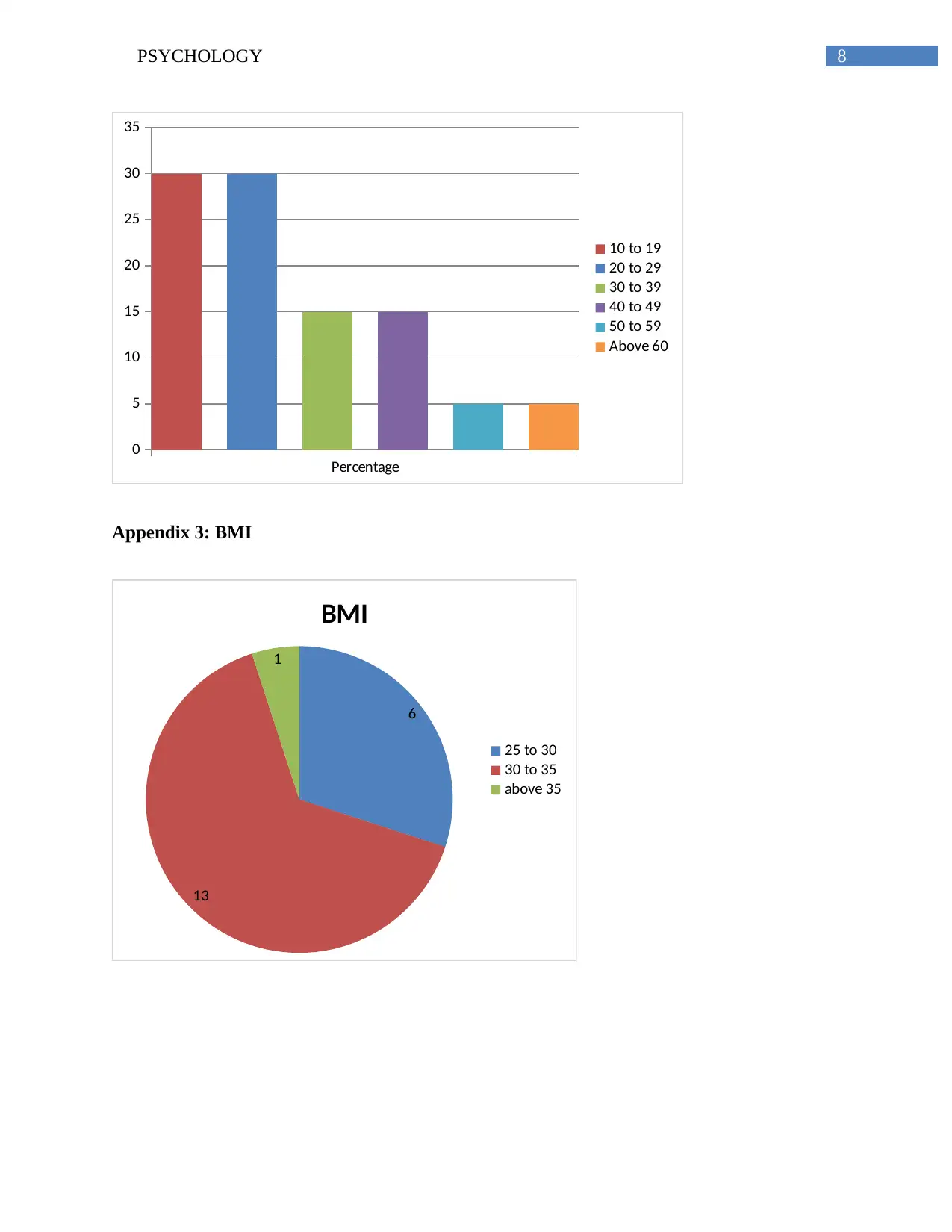
8PSYCHOLOGY
Percentage
0
5
10
15
20
25
30
35
10 to 19
20 to 29
30 to 39
40 to 49
50 to 59
Above 60
Appendix 3: BMI
6
13
1
BMI
25 to 30
30 to 35
above 35
Percentage
0
5
10
15
20
25
30
35
10 to 19
20 to 29
30 to 39
40 to 49
50 to 59
Above 60
Appendix 3: BMI
6
13
1
BMI
25 to 30
30 to 35
above 35
⊘ This is a preview!⊘
Do you want full access?
Subscribe today to unlock all pages.

Trusted by 1+ million students worldwide
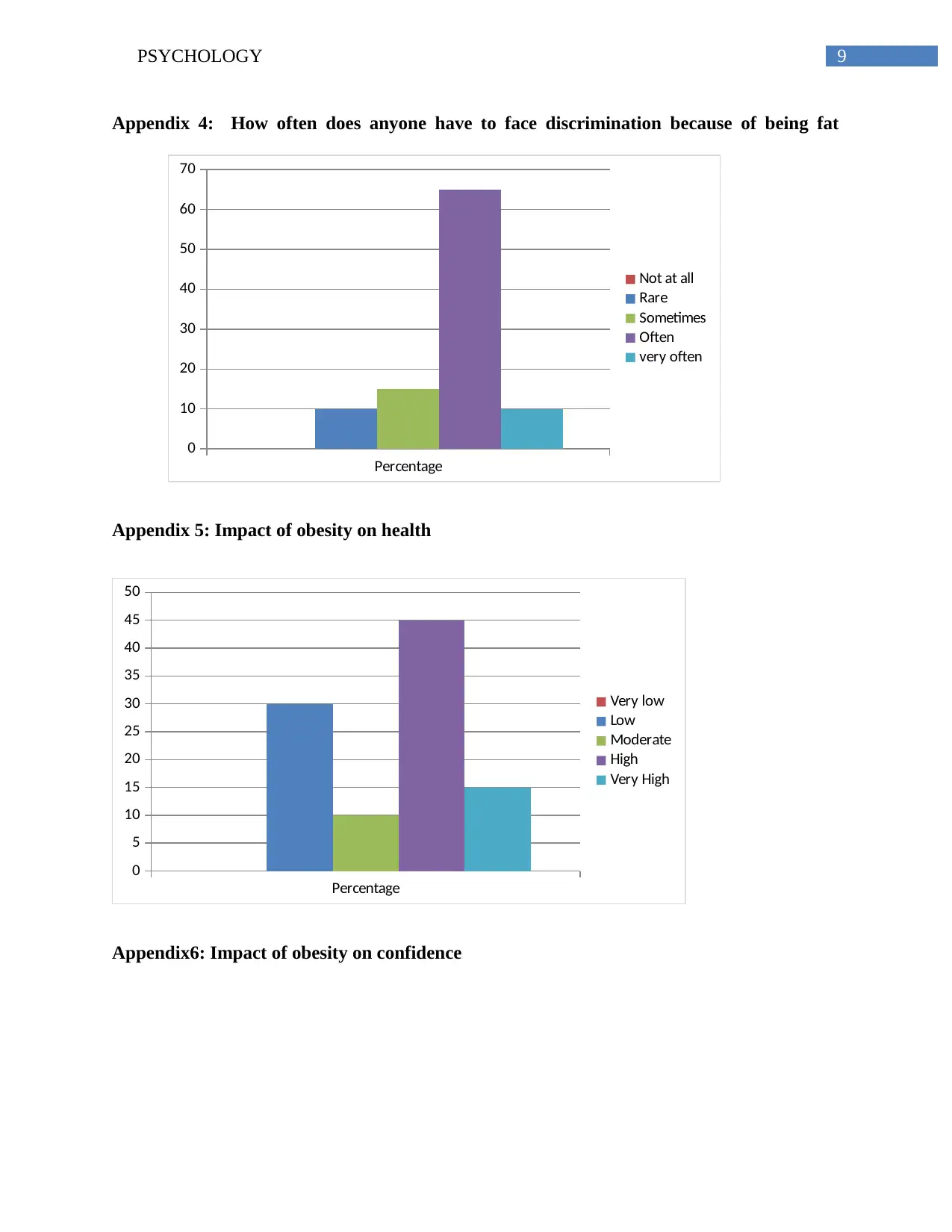
9PSYCHOLOGY
Appendix 4: How often does anyone have to face discrimination because of being fat
Percentage
0
10
20
30
40
50
60
70
Not at all
Rare
Sometimes
Often
very often
Appendix 5: Impact of obesity on health
Percentage
0
5
10
15
20
25
30
35
40
45
50
Very low
Low
Moderate
High
Very High
Appendix6: Impact of obesity on confidence
Appendix 4: How often does anyone have to face discrimination because of being fat
Percentage
0
10
20
30
40
50
60
70
Not at all
Rare
Sometimes
Often
very often
Appendix 5: Impact of obesity on health
Percentage
0
5
10
15
20
25
30
35
40
45
50
Very low
Low
Moderate
High
Very High
Appendix6: Impact of obesity on confidence
Paraphrase This Document
Need a fresh take? Get an instant paraphrase of this document with our AI Paraphraser
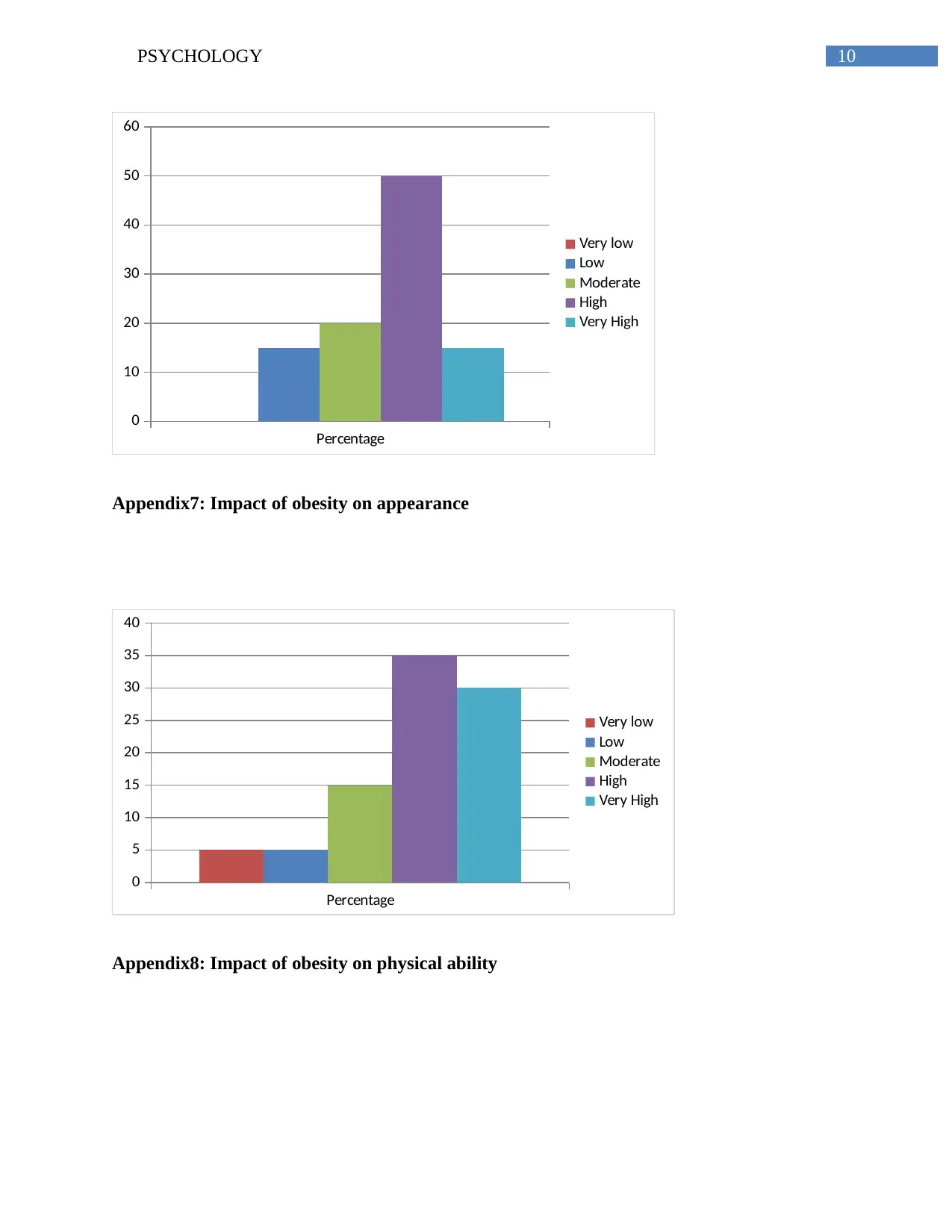
10PSYCHOLOGY
Percentage
0
10
20
30
40
50
60
Very low
Low
Moderate
High
Very High
Appendix7: Impact of obesity on appearance
Percentage
0
5
10
15
20
25
30
35
40
Very low
Low
Moderate
High
Very High
Appendix8: Impact of obesity on physical ability
Percentage
0
10
20
30
40
50
60
Very low
Low
Moderate
High
Very High
Appendix7: Impact of obesity on appearance
Percentage
0
5
10
15
20
25
30
35
40
Very low
Low
Moderate
High
Very High
Appendix8: Impact of obesity on physical ability
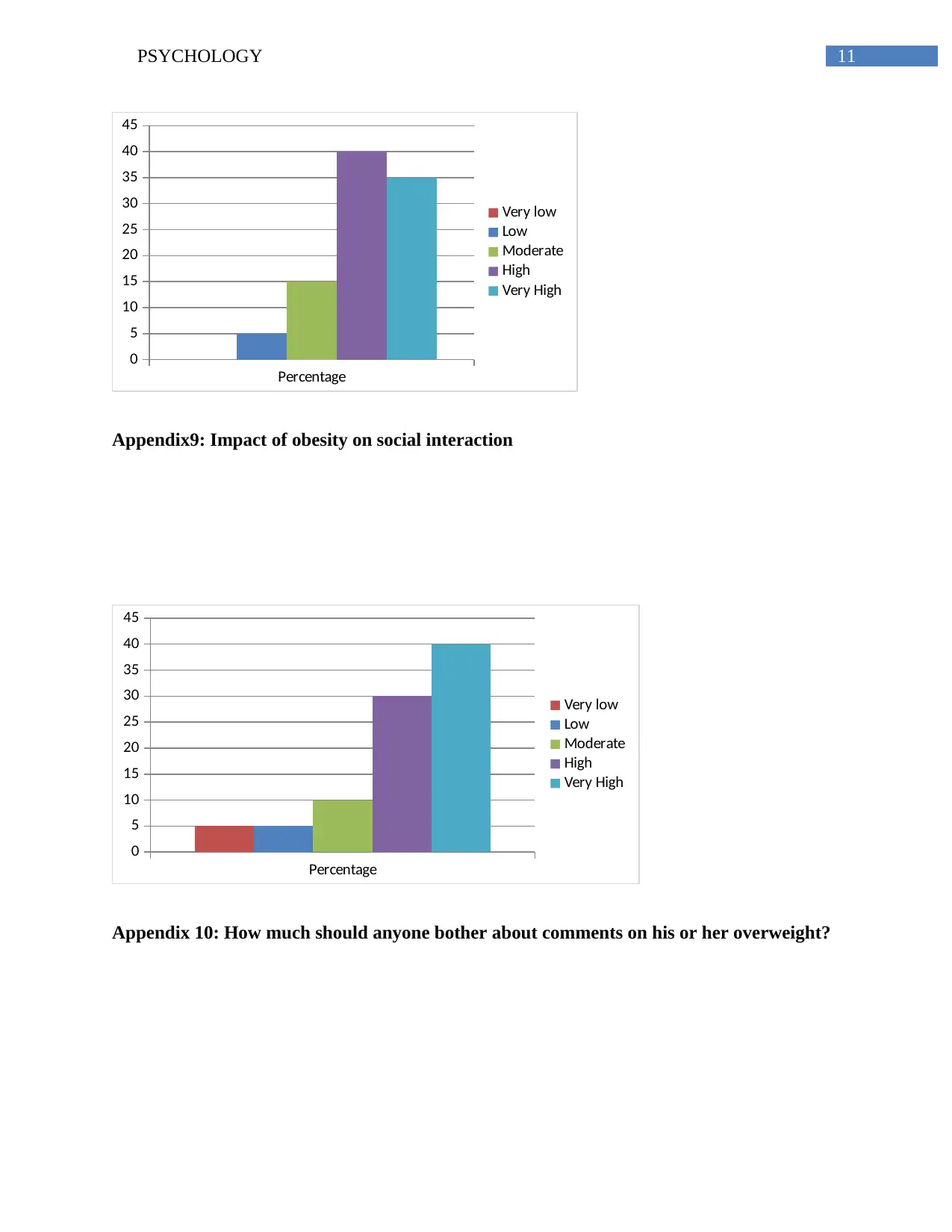
11PSYCHOLOGY
Percentage
0
5
10
15
20
25
30
35
40
45
Very low
Low
Moderate
High
Very High
Appendix9: Impact of obesity on social interaction
Percentage
0
5
10
15
20
25
30
35
40
45
Very low
Low
Moderate
High
Very High
Appendix 10: How much should anyone bother about comments on his or her overweight?
Percentage
0
5
10
15
20
25
30
35
40
45
Very low
Low
Moderate
High
Very High
Appendix9: Impact of obesity on social interaction
Percentage
0
5
10
15
20
25
30
35
40
45
Very low
Low
Moderate
High
Very High
Appendix 10: How much should anyone bother about comments on his or her overweight?
⊘ This is a preview!⊘
Do you want full access?
Subscribe today to unlock all pages.

Trusted by 1+ million students worldwide
1 out of 13
Related Documents
Your All-in-One AI-Powered Toolkit for Academic Success.
+13062052269
info@desklib.com
Available 24*7 on WhatsApp / Email
![[object Object]](/_next/static/media/star-bottom.7253800d.svg)
Unlock your academic potential
Copyright © 2020–2026 A2Z Services. All Rights Reserved. Developed and managed by ZUCOL.





